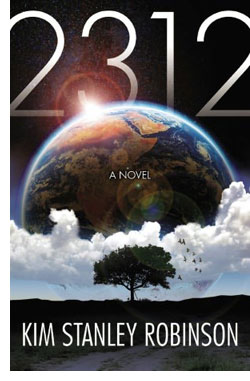 |
 Kim Stanley Robinson
Kim Stanley Robinson
2312
Orbit / Hachette Book Group
US Hardcover First Edition
ISBN 978-0-316-09812-0
Publication Date: 05-22-2012
564 Pages; $25.99
Date Reviewed: 06-20-12
Reviewed by: Rick Kleffel © 2012
Index:
Science Fiction
Vision is a thing of motion, the non-stop action of imagination cast before our eyes. Kim Stanley Robinson creates visions of the future so intense with story and character that they threaten to replace the world within which we read them. His latest novel, '2312' is based on a seemingly simple premise; what will the world feel like three hundred years hence?
The trick word in that question is of course "feel." It is one thing to extrapolate technological trends, and Robinson is easily one of the best. But Robinson excels at creating characters who live inside the worlds he extrapolates, then letting their very human stories play out in his imagined worlds. '2312' offers readers a panoramic vision of the human race inhabiting the solar system, with a story and characters every bit as compelling as the environment in which the story unfolds.
'2312' runs on a wide screen and is written to the format, but Robinson starts with the story. We meet Swan Er Hong on the surface of Mercury, living dangerously as she takes in the sunrise. When she returns, she learns that her grandmother, with whom she shared some confidences, has died, and perhaps not naturally. The political alliances of the Solar System, never particularly stable, are becoming alarmingly less so. Swan is drafted to replace her grandmother as conflict creeps into the open.
'2312' is more than a far-future science fiction thriller, though it could have been written in that style. But Robinson the visionary takes a cue from John Dos Passos' USA Trilogy and structures his novel with slices of plot, prose poetry, and newspaper clippings from the future he imagines. He's a ruthless self-editor, and the literary devices he employs are every bit as compelling as the story they surround. They're also cleverly used to drive the plot forward as well. They're not just scenery.
The intensity of vision and story that Robinson brings to '2312,' is matched by the power of his prose. When he's storytelling and following his characters, he strips it down to the scene at hand and uses his skill to bring us into that scene. But he's also capable of rich, evocative descriptions that beg to be read aloud, and faux found prose poetry in which the words are as delightful as the concepts.
The stories that weave through '2312' — a romance, a thriller and a mystery — grow naturalistically from his characters and settings, but explore concepts and conflicts that we're facing right now; the costs of capitalism, the effect of human civilization on the environment it unfolds in and just what it means to be human. Robinson immerses us in his world but keeps the storyline tight.
Characters are handled in am interesting manner as well. Swan is our entry into '2312,' a literally mercurial character from the planet Mercury. She seems eminently likable, at least at first. When we meet her counterpart, Fitz Wahram, he's not quite so engaging. A native of Saturn, he's literally saturnine, a huge pear-shaped man who moves slowly and seems sort of obtuse. In the course of the novel, as the two get to know one another under less-than-felicitous circumstances, Robinson balances out our feelings with some keenly constructed set pieces.
There's no mistaking that '2312' is an ambitious novel; and upon reading it, that it lives up to its considerable ambitions. But given the number of moving parts that Robinson includes here, the literary flourishes as well as the science-fiction genre tropes, the fact that '2312' is more than the sum of its parts is the real discovery. The future is a foreign country, but a writer with the art of Kim Stanley Robinson can provide us with more than a mere travel guide. '2312' is an adventure that shows us the sights, but more importantly, more engagingly, it speaks to the soul of the future, the past and the present.
|
 |




